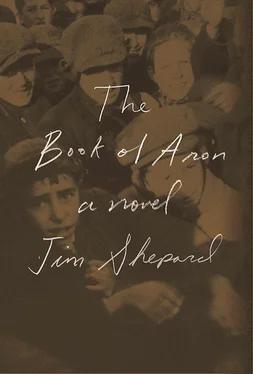She walked by a few minutes later and Lutek asked her and she came back with a mug of coffee with milk in it and passed it to him through the bars. He shared it with the man with the bloody head.
“You’re shaking your whole chair,” he said to me.
He said Boris had told him he’d been here once and found himself in the same cell with the guy who’d pointed him out to some Germans on the street.
“What did he do?” I asked.
“What do you think?” Lutek said.
“It was like they were waiting for us,” he said a few minutes later. When I didn’t say anything, he said, “Did you hear what I said? It was like they knew we were coming.”
“Do you think once they talk to us they’ll let us go?” I whispered.
“How would I know?” he said.
He asked if Lejkin had any more war news. I told him no. He said he heard the Germans were taking a beating outside Moscow and Leningrad. The man with the bloody head told him to be quiet. Lutek told him the joke that when Napoleon invaded Russia he put on a red tunic in case he was wounded, and Hitler put on brown pants. The man with the bloody head got up and moved as far away as he could.
Finally two German soldiers appeared with a list. They mispronounced our names but we raised our hands. They took us out into a courtyard in the back without windows. One soldier took Lutek by the shoulders and pushed his back against the wall.
We couldn’t tell if they understood Polish. Lutek said to them, “Are you really going to kill me over some turnips?” and the German who’d pushed him shot him. His head hit the wall so hard that his rabbit-skin cap landed on the dirt in front of him. Because of his wooden shoes each foot skidded out from under him in a different direction. The other German was so upset by the noise I made that he knocked me to the ground. The two of them picked me up and carried me back through the waiting hall past the rooms with the benches and threw me out onto the street.
ON MY WAY HOME MY LEGS ACTED LIKE I KEPT FORGETTING how to walk and I stopped in the center of the road. I threw my own cap away. A truck honked and someone finally dragged me to the curb.
Three or four times a day my mother asked what was wrong. After a few days she told Boris’s mother there was nothing for her to do but to keep her shoulder to the plow until she fell on her face. Boris’s mother said that was all anyone could do. Boris asked me where Lutek had disappeared to and I told him I didn’t know. His sister was always weeping and he told her to shut up from where he was lying on the floor. She rubbed her crippled hand, which was what she did to calm herself. My mother made a new project of painting the beds with turpentine and ammonia to kill the bedbugs but stayed sad that I wouldn’t talk with her. “Someday you’ll wish you had,” she said.
One night I got up and sat with her in the kitchen. She blew on the fire in the stove and waved a rag near the open grate and watched me scratch at my lice. When I was finished she asked if I was hungry. I asked if there was anything she could do about that and she said no.
Boris’s mother said from her pallet in the dark she’d heard that the refugees were taking over the apartments of those who starved to death or died of the typhus. She said that with the cold they invaded any place they could and chopped and burned whatever furniture they found. My mother said that nowadays they took the roof away from over your head the minute you turned your back.
And who was to stop them? Boris’s mother wanted to know.
No one should look for heroes on our street, my mother told her.
I told her not to get herself worked up and she told me that I always wanted to know why she was so upset and meanwhile here we all were, with everyone either dying or waiting their turn. Boris snickered from the hallway.
She said she wasn’t a young woman and that if it wasn’t for my sake she wouldn’t have had the strength to do this.
Do what? Boris wanted to know. Keep us all awake?
She said my still being here with her was beshert. Did I know what beshert meant?
I didn’t, I told her. I was tired of her talking.
Beshert meant “meant to be,” she said. She said she knew I needed her, even if I didn’t. She was wearing the nightshirt my father liked, though it wasn’t as warm, in case he came home in the middle of the night. I wiped my eyes so hard I blinded myself at first.
“Why do you act like this?” Boris’s mother said from her pallet. “Do you think your mother needs this now?”
“Shut up, all of you,” Boris said. When his sister whimpered he said, “You shut up too.”
My mother and I watched the embers in the stove through the grate. “I work and I worry,” she said. “That’s what I do.”
“I’m sorry,” I told her.
“I know,” she said and then told me I should try to sleep.
I didn’t see Boris for a day and then he came home and stood in front of me, enraged. I asked where he’d been and he knocked me down with a forearm to my face. That night he threw my sleeping pallet into my mother’s room. She asked what was going on and I climbed into her bed.
She fell down the next morning when she tried to wash herself near the stove and we couldn’t get her up. At first Boris wouldn’t help but then finally we carried her to the hospital and a doctor who was sick himself told her she’d gotten the typhus she’d been waiting for. She passed out after he told her. They put her on a cot in the hallway and another patient beside her told her the news about America having entered the war. Her reaction disappointed him. She had such a fever I could feel the heat standing next to her and her chills were so bad the other sick people moved their cots farther away. While I sat with her she wept and tried to keep covered up and apologized for the smell. Her diarrhea meant she had to keep getting up and she no longer had the energy to fully clean herself. She said she didn’t want me to catch anything and told me to leave and then asked me to stay. I told her she’d probably caught what she had from me.
They moved her to the quarantine ward and left her on a pallet in another hallway. No one gave her medicine. I was told I couldn’t stay but no one noticed I hadn’t left. A woman holding her baby shouted, “This is supposed to be a hospital! I should burn it down!” Her baby’s face was blue.
We were outside a separate quarantine room for children. When I looked in they never moved their hands but just lay there in their beds.
She wanted me to make sure Boris and his mother knew which hospital it was so my father and brothers would know where to find us. She sent me home to tell them. She told me to stay there but I went back and forth when she slept. They served her blood soup she liked and spit soup she didn’t. It was spit soup because it used unthreshed grain and the husks had to be spit out.
She was sick for ten days. “I was sad, I thought only of myself, I let you support me,” she told me on one of the days. “The holidays again,” she complained on another. I didn’t know what she was talking about. Her fever got bad and then better and then bad again. She asked if I had any good memories and I told her I did. She asked me to tell her some. I told about things I remembered from before we moved to the city. I told her I remembered a picnic in the woods with blackbirds around me in the thick grass and her standing over me and making a shadow for me in the bright sunlight. She said she knew what happened on the streets and that she saw it for herself. “You get like a little animal,” she said. “You lie, you cheat.”
I asked to see the doctor who’d told her she had the typhus and a nurse said he’d died. My mother was moved to another hallway on another floor and no one said why. “I wanted to be nusik,” she told me. She wiped her cheeks on the pillow to cool her face. She asked if I knew what nusik was and when I told her I didn’t she said that it was something good. Someone useful and smart. She said that if she’d been nusik, then people who couldn’t get along, people with problems, would have come to her. She would have listened. She would have contributed more than she had.
Читать дальше












